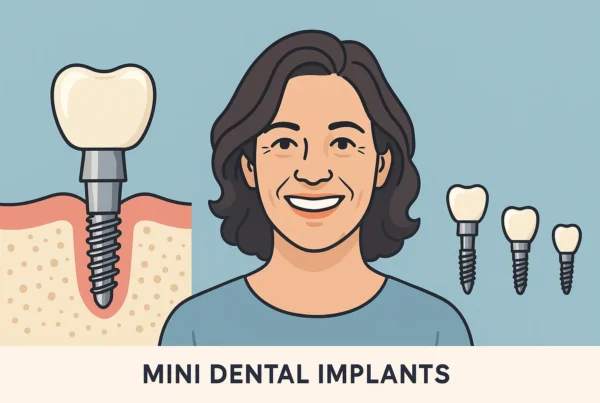Does Insurance Cover Dental Implants? Understanding Your Options.
Dental implants are widely regarded as the gold standard in tooth replacement—but the question of insurance coverage remains one of the biggest sources of frustration and confusion for patients. While implants offer transformative benefits in oral function, appearance, and long-term oral health, navigating the financial side of this treatment can feel like deciphering a complex code. Many patients assume implants are never covered by insurance, while others are surprised to find partial benefits hidden in the fine print. What causes this disconnect?
The truth lies in the evolving nature of dental insurance and its often inconsistent approach to advanced technologies like implants. Unlike more traditional procedures such as fillings or dentures, implants may fall into coverage gray areas depending on the plan, the insurer, or even the way the procedure is coded. This ambiguity leaves many patients in limbo—unsure of what to expect, hesitant to move forward, and vulnerable to unexpected costs. This article aims to remove that uncertainty, offering clarity and practical guidance so patients can confidently pursue the care they need without financial guesswork.
The Truth About Insurance Plan Types and Implant Coverage
Understanding the type of dental insurance you carry is the first step in determining your eligibility for implant coverage. Most dental policies fall into two broad categories: Basic and Premium. Basic dental insurance plans are often more affordable and tend to cover preventive services, minor procedures, and routine care. However, they rarely, if ever, include benefits for advanced restorative work such as dental implants. On the other hand, Premium plans may come with a higher monthly cost but often include partial coverage for dental implants, sometimes up to 50% of the cost.
This difference in coverage tiers can dramatically affect a patient’s out-of-pocket expenses. Premium plans may also offer other favorable terms—such as shorter waiting periods, higher annual maximums, and fewer exclusions—that make it easier to get implants approved. Understanding which category your plan falls into isn’t just useful—it’s essential. It empowers you to have informed conversations with your provider and avoid costly surprises. Comparing both types side-by-side is a necessary part of any long-term dental care plan, especially when considering a high-ticket procedure like implants.
Decoding Dental Insurance Terms and Limitations
Even within Premium plans that include implants, coverage is often subject to a host of limitations, restrictions, and hidden variables. Key terms such as annual maximums, deductibles, co-pays, and exclusions play a pivotal role in determining how much your insurance will actually pay toward the procedure. For example, many plans cap benefits at $1,500 per year, while the average dental implant can cost between $5,000 and $7,000 per tooth. That leaves a significant financial gap patients must cover out-of-pocket.
Further complicating the picture are clauses related to pre-existing conditions or missing tooth exclusions. These stipulations may render the patient ineligible for coverage if the tooth was lost before the policy began. Additionally, some plans impose waiting periods of 6 to 12 months before covering major restorative work. The takeaway? A plan’s inclusion of implants doesn’t guarantee affordability. You must examine each clause and ask targeted questions of your provider to truly understand what is and isn’t covered.
How 2025 Trends Are Reshaping Implant Coverage
As the dental insurance industry evolves, trends in 2025 suggest a gradual shift toward broader inclusion of dental implants in coverage. In response to rising consumer demand and competition among insurers, companies are updating their plan offerings. Newer PPO plans, such as those from Delta Dental and Cigna, are beginning to combine favorable waiting periods, expanded networks, and coverage of up to 50% for implant procedures. These improvements reflect a recognition of implants as not just cosmetic luxuries but functionally necessary treatments.
Moreover, employer-sponsored plans are increasingly offering implant-inclusive coverage as part of their Premium options. As more patients advocate for comprehensive dental benefits, insurers are adjusting accordingly. This trend offers hope for patients previously excluded from coverage, but it also emphasizes the importance of researching the most current plan options. If you’re considering dental implants in the near future, it’s a smart move to reassess your insurance annually and consider switching to a plan that better supports your long-term oral health needs.
Smart Alternatives When Insurance Doesn’t Cover Implants
For patients whose insurance provides little to no support for dental implants, all hope is not lost. Several alternative financing options can make the procedure more affordable without sacrificing quality of care. Dental discount plans are one such alternative. These plans are not insurance, but they provide access to negotiated rates and upfront discounts on treatments, including implants. There are no deductibles, waiting periods, or annual caps—making them an appealing option for immediate care.
Another increasingly popular option is in-office payment plans. Many dental practices now offer flexible financing arrangements that break the cost of implants into manageable monthly payments. This approach gives patients the ability to budget more effectively without needing to rely on third-party lenders. However, for those seeking even more structured support, companies like CareCredit and LendingClub offer third-party financing specifically for medical and dental procedures. These services extend credit lines with varied interest rates and terms, allowing patients to choose a plan that fits their financial reality.
Cracking the Claims Process: From Paperwork to Appeals
Understanding how to file an insurance claim for dental implants—and how to respond if that claim is denied—can significantly improve your chances of getting coverage. The first step in this process is pre-treatment planning. A comprehensive, written treatment plan submitted to the insurer before any procedure is done serves two purposes: it provides a blueprint for treatment and helps pre-qualify the claim for approval. Including diagnostic images, cost estimates, and clear documentation of medical necessity strengthens your submission.
Even with detailed pre-treatment plans, claims may still be denied due to coding errors or unclear medical justification. This is where appeals come in. An appeal is your opportunity to challenge the denial with a revised claim, additional documentation, or even a letter of support from your dentist. Persistence pays off—many patients secure partial or full coverage after the appeal process. Success depends on knowing how to navigate insurance language, understanding your policy’s fine print, and having the support of a dental office experienced in managing claims.
Building a Checklist: What to Look for in Implant-Friendly Insurance
Choosing the right insurance plan for dental implants requires more than just glancing at the premium cost. Patients should adopt a checklist approach to evaluate a policy’s real value. First, look for a plan with a high coverage percentage—ideally 50% or more—for major restorative procedures. Next, examine the annual limit; plans with higher caps ($2,500 or more) will better accommodate implant expenses. Also, assess the plan’s waiting period. The shorter the wait, the sooner treatment can begin.
Another key factor is the network of providers. A wide network gives you more options and improves your chances of finding a dentist experienced in implantology. Lastly, scrutinize exclusions for pre-existing conditions or missing teeth. Policies that waive or do not include these clauses provide greater flexibility. Having a comprehensive checklist empowers patients to compare plans efficiently, ask better questions, and select the insurance that aligns with their dental goals.
Getting Expert Help: Why Professional Guidance Pays Off
Navigating the world of dental insurance can be overwhelming, especially when dealing with high-cost procedures like implants. That’s why seeking expert advice from dental professionals or insurance coordinators can make a significant difference. Most dental practices employ specialists who understand how to interpret policy documents, pre-authorize treatments, and file detailed claims. They can offer insights that help patients avoid common pitfalls and increase the likelihood of reimbursement.
Moreover, consulting with a third-party insurance expert or financial advisor can be invaluable for patients juggling multiple plans or considering switching coverage. These professionals can perform side-by-side comparisons of plan features, explain cost-benefit tradeoffs, and offer advice on how to structure payments for maximum savings. Leveraging their expertise doesn’t just save time—it can lead to hundreds or even thousands of dollars in financial benefits over the course of your treatment.
Making a Financial Game Plan That Combines Insurance and Budgeting
Even the best insurance plan may not cover the full cost of dental implants, which is why financial planning is essential. A comprehensive approach blends insurance benefits with out-of-pocket budgeting to ensure that the cost of implants doesn’t become a financial burden. Start by calculating how much your insurance will cover, factoring in annual caps and coinsurance rates. Then, build a savings buffer to cover remaining expenses. Setting aside funds monthly in a healthcare savings account or dedicated dental fund can help manage the cost over time.
Another smart move is timing your treatment around benefit periods. Many patients schedule multi-stage implant procedures to span across two benefit years, effectively doubling their available coverage. For example, having the implant post placed in December and the crown seated in January may allow you to take advantage of two annual maximums. When insurance and budgeting work hand-in-hand, the cost of implants becomes far more manageable—and significantly less stressful.
Final Takeaways: Crafting Your Path to Affordable Implants
Securing coverage for dental implants doesn’t have to be a gamble—it’s a strategic process that rewards preparation, persistence, and the right partnerships. By understanding how different plans categorize implant procedures, reviewing annual limits and exclusions, and taking proactive steps during the claims process, patients can dramatically increase their chances of receiving insurance support.
But insurance isn’t the only path to affordability. Alternative financing options, expert guidance, and smart budgeting strategies can also bridge the gap between your goals and your resources. The key takeaway is that with the right information and a proactive mindset, dental implants are not only accessible—they’re achievable. Whether you’re just beginning your research or on the verge of treatment, this guide equips you to take the next step with clarity and confidence.
Don’t wait any longer for the smile you’ve been dreaming of. Contact Elaine Wu ReNEW Dental in Tewksbury, MA today! Call 978-451-1500 or visit our website to schedule your consultation.
Schedule your consultation today!
FAQs
Do most dental insurance plans cover dental implants?
Many premium dental insurance plans now offer partial coverage for implants, typically up to 50% of the procedure’s cost. However, coverage varies widely, and patients should always check specific policy details to confirm eligibility and limitations.
What should I do if my dental insurance doesn’t cover implants?
If your plan excludes implants, explore alternatives like dental discount plans, in-office payment programs, or third-party financing options. These approaches can help make implants affordable without relying solely on traditional insurance.
Can I appeal a denial of coverage for dental implants?
Yes, and in many cases, appeals are successful. Submit a detailed treatment plan, provide supporting documentation, and consider working with your dentist or an insurance expert to challenge the denial and advocate for coverage.
Related Articles
- Dental Implants
- Same-Day Dental Implants
- Affordable teeth implants
- Dental implants surgery
- Dentures with implants
- Full Mouth Dental Implants
- Mini Dental Implants
- Zirconia Dental Implants
See More Reviews From ReNew Dental Denture and Implant Center. View information about local places in our community. Get Driving Directions to Our Practice
If you’d like to get an estimate on your dental implants, take our implants quiz today!




